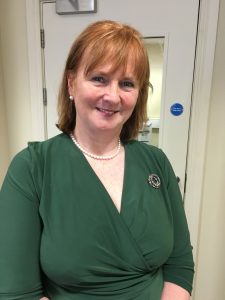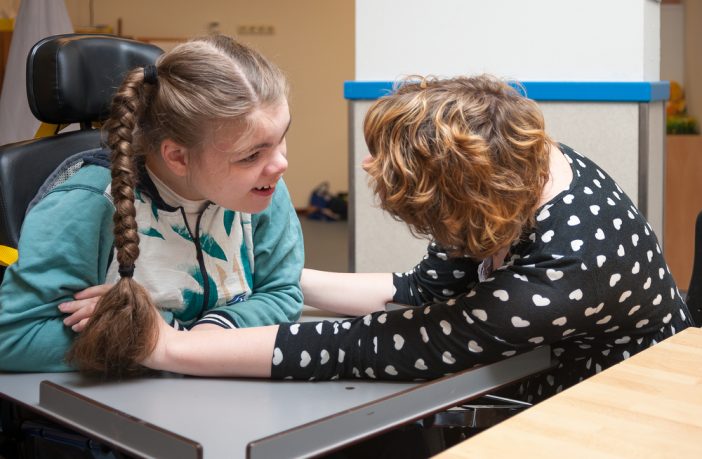Sheila Counihan has worked in nursing practice and education for over 40 years, and is qualified in Adult and Mental Health nursing with a Masters degree in Learning Disability Mental Health. She is currently leading on the development of a new distance learning pre-registration learning disability nursing programme for the OU which we hope to launch in the near future.

Sheila Counihan
For most of her clinical career, Sheila has cared for and supported people with learning disabilities. We asked her to tell us more about learning disability nursing and why it’s different…
What do we mean when we talk about people with learning disabilities?
People who have learning disabilities have a reduced ability to understand in general, and they may struggle with abstract thinking in particular. Each person is unique and their level of ability and disability varies. There are many causes of learning disability.
Some people also have one or more physical health conditions such as a congenital heart disease, or physical disabilities such as a hearing deficit or difficulty with walking independently. Some health conditions can be associated with the original cause of their learning disability and many health conditions may be attributable to poor diet and lifestyle. People who have learning disabilities often need support to recognise their own healthcare needs.
Does having a learning disability mean they can’t learn the same as everyone else?
Having a learning disability does not mean that you can’t learn new things. Like anyone, with the right support and appropriate opportunities, someone with learning disabilities can learn and develop throughout their life.
How do learning disabilities differ from other disabilities?
A learning disability, sometimes referred to as a developmental disability, is identified before the age of 18 – before the brain is fully developed. It is a lifelong condition that is different from brain injury, which is acquired through illness or trauma after the age of 18 – when we believe the brain is fully developed.
How is nursing different for people with a learning disability?
In many ways, caring for people with a learning disability is no different to caring for someone without it. People with learning disabilities are entitled to the same standard of care as anyone else, but they need more support from healthcare professionals to identify, assess, understand and treat health conditions.
This is where the specialist learning disability nurse comes in. They have an in-depth knowledge of people with learning disabilities, the ways they may communicate when in pain or distress, and how to communicate effectively with them.
For example, learning disability nurses must be able to give clear explanations, using suitable communication aids such as extra time, sign language, pictures and drawings. We also need to help people to communicate what they want and need, so we can understand them and can properly assess and treat them.
How do you adapt traditional nursing skills to care for those with learning disabilities?
As well as excellent communication skills and knowledge of different communication methods, nurses need to use appropriate assessment tools. Learning disability nurses are taught and trained how to use specialist tools tailored for people with learning disabilities to ensure assessments are as accurate as possible.
Learning disability nurses develop excellent communication skills and are able to spot signs and symptoms in a person even if they don’t recognise they are ill themselves.
Do you have to have special training for this kind of nursing?
To provide the best standard of care for people with learning disability, nurses must complete a specific nursing qualification which has been validated by the UK Nursing and Midwifery Council (NMC). Currently, you can do this at a number of other universities, but you’ll need to study in the more traditional manner over three years on a full-time basis.
At the OU, we will be delivering a part-time, pre-registration distance learning programme in learning disability nursing from September 2019. We have already been delivering adult and mental health nursing programmes since 2002, but this is the first time we have delivered learning disability courses.
To apply for the OU nursing programme, you must be working as a healthcare support worker and have your employer’s support.
What difference could having a nurse with specialist learning disability skills make to patients?
All nurses need excellent observation and assessment skills. To care for people with learning disabilities, those core skills need to be a step beyond excellent.
This is where learning disability specialist nurses come into their own. Because they work with this group of people all the time, they get to know them well. They understand each person’s communication strengths and needs, so are well placed to support those who need help and assistance to maintain a healthy, good quality of life.
Should there be more trained, specialist learning disability nurses?
Over the past few decades, this field of practice has not been publicised widely enough and there have been limited places on training programmes. And because of the difficulties recruiting sufficient students, several universities are no longer providing the programme. As a result, there’s currently a shortage of qualified learning disability nurses across the UK.
This is where the OU programme can help. Because our students are already working with people who have learning disabilities, they are committed to working in this area and welcome an opportunity to progress and gain a professional qualification.
What would you say to anyone considering learning disability nursing?
I’d encourage anyone to consider learning disability nursing as a career. My career has spanned adult, mental health and learning disability settings, but I’ve found working with people who have learning disabilities the most rewarding area to work in by far.
The people we support and the staff who choose to work in this area are always great to work with, and the staff are committed above and beyond what is expected of them. They always strive to provide a high standard of care and support to people with learning disabilities.



